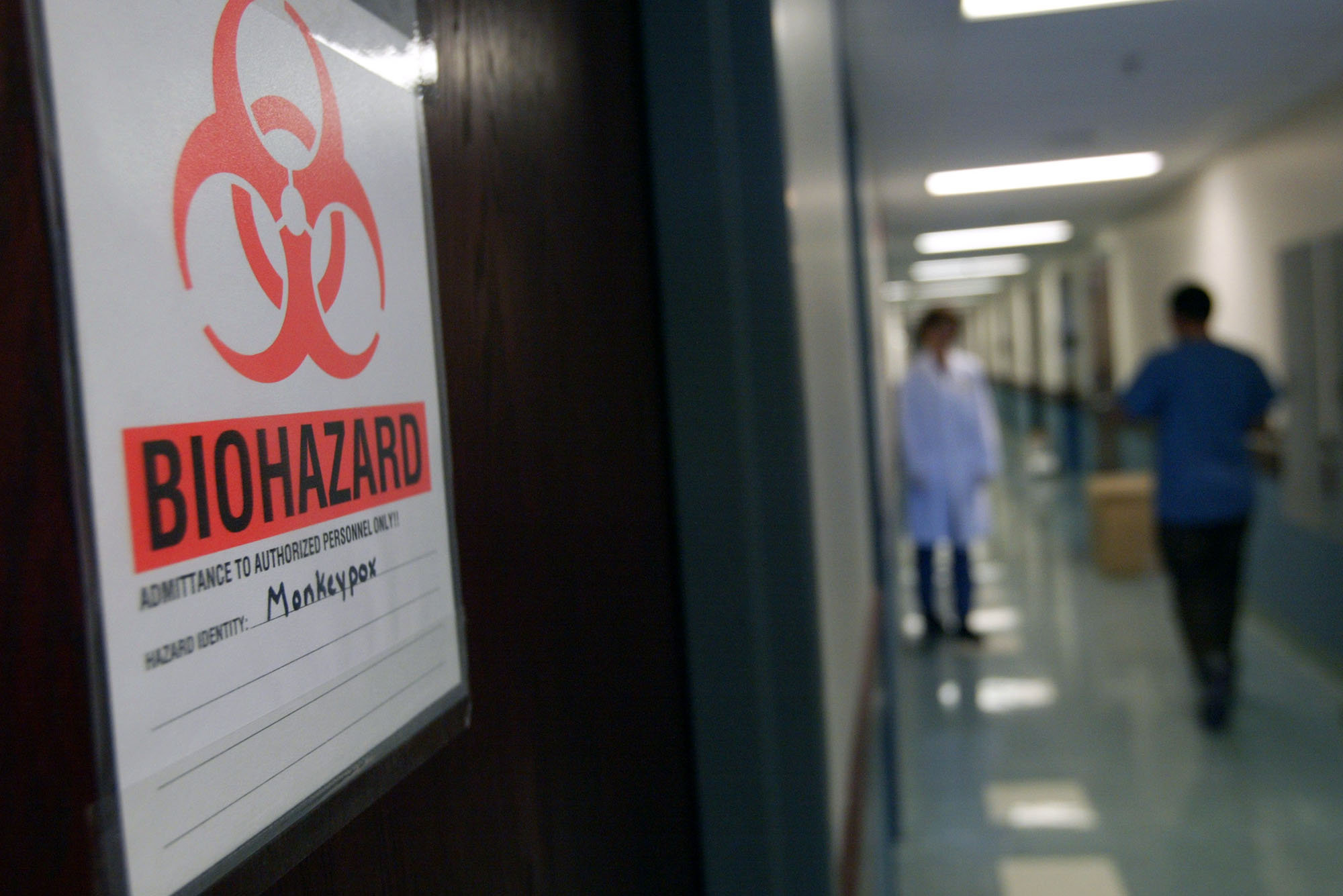Monkeypox Cases—and Concern—Climbing
“The situation is getting more and more complicated,” says BU virologist John Connor

A biohazard sign is posted at the University of Minnesota’s Veterinary Diagnostic Laboratory, which was chosen by the US Centers for Disease Control and Prevention as the national testing site to screen for the monkeypox virus in animals. Photo by Judy Griesekieck/Star Tribune via Getty Images
Monkeypox Cases—and Concern—Climbing
“The situation is getting more and more complicated,” says BU virologist John Connor
Concerns about monkeypox are mounting, as cases climb in the United States and abroad. On July 23, the World Health Organization deemed the virus a Public Health Emergency of International Concern (PHEIC). Governors in New York, California, and Illinois have followed the WHO’s lead, while the demand for vaccine doses continues to outpace supply.
Endemic to central and western Africa, the virus is known for popping up on the international radar from time to time, even as recently as 2021. But Tedros Adhanom Ghebreyesus, WHO director-general, described the 2022 surge as “an outbreak that has spread around the world rapidly, through new modes of transmission, about which we understand too little.”
In May, shortly after the United States confirmed its first case, The Brink discussed the properties of the virus with John H. Connor, a virologist at Boston University’s National Emerging Infectious Diseases Laboratories (NEIDL) and a School of Medicine associate professor of microbiology. After two months during which more than 6,000 US cases were reported, The Brink spoke with him again about what’s changed.
Q&A
with John H. Connor
The Brink: What does declaring a PHEIC do in practice?
Connor: Beyond sounding the alarm, it allows both the WHO and governments to devote more resources to the outbreak. Prior to this outbreak, monkeypox has been repeatedly introduced from various countries usually with no transmission, or occasionally some transmission that was fairly quickly stopped. There are clearly places in which the virus is endemic, and I don’t want to suggest that that isn’t an emergency of its own, but the current outbreak is something new. The WHO originally thought this was going to be like monkeypox that was imported into the UK in 2018, the United States in 2003, or either of the two separate introductions in 2021…but it turns out that it wasn’t the same.
The Brink: So, what’s the threshold for emergency? Is it based on the number of cases, the number of countries?
Connor: There are way too many variables for me to solve the integral on this. At this point, we can look at some social aspects. We are talking about a virus that is spreading worldwide, but before now, this particular virus clade [a group of organisms with a common ancestor] was found primarily in western Africa. The fact that the virus is now spreading far beyond its original geographic circulation area and that cases continue to rise makes it an emergency.
The Brink: Isn’t it somewhat of a misconception that men who have sex with men (MSM) are more susceptible? I remember one physician was quoted as saying “the virus doesn’t care.”
Connor: I think that statement is correct. The virus doesn’t preferentially infect people from the MSM community any more than it infects nerdy professors that are around 50 years old. The infection spreads based on close contact, and you can have close contact in many different ways. Right now, it is spreading in the MSM community, but if the virus is given the opportunity to spread more broadly, it will do it. That’s the history of infectious disease.

The Brink: The White House appointed two monkeypox coordinators earlier this week. Is that an adequate response, rather than a declaration of federal emergency?
The original idea with monkeypox was that there would be a few imported cases, transmission for a couple of weeks, but then it would be addressed and transmission would be extinguished. For that situation, you don’t set up command centers in all 48 contiguous states with reporting structures up and down and across. Then, when it appeared that monkeypox was not going to go away quickly, the United States expanded lots of things, like testing and vaccines, which I think is a very positive response…. But even as I’m describing these things, we can both appreciate that the situation is getting more and more complicated. So, you need people to coordinate this response. I don’t think that we are at the point where there needs to be a task force that is as large as the one created to deal with COVID, because I don’t think we’re at that disease burden.
The Brink: What’s the deal with the monkeypox vaccine?
Let me start all the way at the beginning: There was the smallpox vaccine, called the vaccinia virus, which is a replicating attenuated virus that’s been used since the 1800s. Vaccinia protected against smallpox, but also provided protection against other poxviruses, including monkeypox. Some people have serious reactions to that vaccine, but vaccinia was used to eradicate smallpox from the planet, so there is no debate about it being highly successful. As smallpox disappeared, it made less and less sense to vaccinate people with something that gives some people strong reactions. The Jynneos vaccine, which is the dominant vaccine in distribution, has the advantage of not causing serious reactions that the original vaccinia has.
The Brink: And what about TPOXX?
TPOXX is a postexposure therapeutic to decrease disease symptoms. You can be vaccinated to defend against infection; individuals already infected can be treated with a therapeutic—it’s a molecule, like ibuprofen or Tamiflu—that specifically targets a poxvirus protein. The goal of treatment is to decrease the ability of the virus to spread throughout the body.
The Brink: In our last conversation, you mentioned that you’re not packing up your car and heading for the hills just yet. Is your car packed now?
The car’s still not packed, but I also don’t want to leave the impression that I am unconcerned. This is not something that can be taken care of like a parent, where somebody can come in and clean up, and then everybody can go back to the way things were. Something has changed. But I think we have the tools, and if everybody works together, we can address this effectively.

Comments & Discussion
Boston University moderates comments to facilitate an informed, substantive, civil conversation. Abusive, profane, self-promotional, misleading, incoherent or off-topic comments will be rejected. Moderators are staffed during regular business hours (EST) and can only accept comments written in English. Statistics or facts must include a citation or a link to the citation.